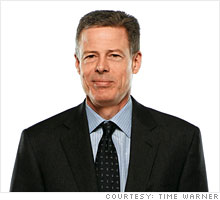Time Warner goes with the cash flow
In spinning off AOL, CEO Jeff Bewkes is focusing on businesses with fast-growing prospects
 |
| Time Warner CEO Jeff Bewkes. |
NEW YORK (Fortune) -- First, I need to disclose that as a loyal Time Warner employee, I've been a shareholder for a long time. Now after a series of exhorbitant deals that handed all the wealth we'd accumulated in decades to the owners of Warner, Turner and AOL, the media giant has at long last embraced a strategy that puts stockholders first.
Let's examine the moves CEO Jeff Bewkes is making to transform Time Warner (TWX, Fortune 500) from a perennial dog into a winner the provides just what value investors covet: high dividends, modest debt and big and growing free cash flow. Today's announced spinoff of AOL is central to that strategy.
Bewkes' first dramatic move was separating Time Warner Cable (TWC), which was 84% owned by Time Warner. The ownership in Time Warner Cable accounted for about half of Time Warner Inc's market capitalization of over $40 billion in early 2009. But Time Warner Cable was providing only about 40% of the parent's free cash flow.
That's because TWC's capital expenditures far exceeded its depreciation expense, while the opposite was true for the rest of Time Warner. The cable company was constantly forced to upgrade its systems to compete with rival satellite and phone companies. By contrast, the movie, network and magazine businesses needed little capital expenditure to remain competitive.
So when Bewkes separated TWX from TWC, he was able to keep most of the cash flow, allowing TWX to keep paying the same dollar dividend of $900 million - with a market cap half the size of the old Time Warner's. Result: The dividend yield doubled to around 3.5%. That high dividend will not only provide a steady, reliable flow of income for investors, it also pressures management to invest the precious dollars it's retaining far more carefully.
The split further strengthened Time Warner by substantially reducing its leverage. At the closing in March, TWC paid TWX a $9.25 billion cash dividend. The big payment, plus TWX's strong cash flow performance in the first quarter, reduces its net debt from $20 billion in late 2008 to a modest $10 billion. For the first time in decades, TWX now boasts a fortress balance sheet.
Time Warner's future is all about free cash flow, how much it can generate consistently right now, and how fast the number will grow. In the past few years, AOL has been a major contributor to TWX's cash flow. Time Warner doesn't break out the precise numbers, but by my estimate, AOL was providing around one-third of cash flow excluding cable as late as mid-2008.
The problem with AOL all along is that this figure kept shrinking. Working with the presentation TWX put out today, I'd reckon that AOL's current share is around 20%. That's still a big number, as much as $1 billion.
The proceeds from the AOL spinoff will probably be a paltry couple of billion dollars. Yet TWX is losing a fat cash cow, albeit one in serious decline.
How will TWX make up for the cash flow it's giving up? Fortunately, its film and network businesses grew operating earnings an impressive 10% and 11% respectively in the first quarter, vs. the same quarter in 2008. The publishing business, however, suffered a 90% drop to just $12 million. All told, Time Warner's free cash flow fell 12%, pummeled by AOL and publishing.
Now, AOL is going. Cash flow will now fall from around $5 billion to $4 billion or less. Bewkes' challenge is to get that number to grow. If he can do that, Time Warner at today's prices will prove a bargain. His predecessors usually blew it, and it's their legacy that keeps a cloud over the stock.
There has been speculation that Time Inc., the division that publishes Fortune and dozens of other magazines, may be the next to be spun off.
Bewkes is apparently keeping his options open. When asked about such prospects in April, Bewkes said Time Warner's future "may well include publishing, but we're not making a religious statement about it either way at this point."
So far, Bewkes is proving a crusader for shareholder value; if he keeps on that path, he could escape the shadow of the worst deal in corporate history, and a few others that weren't as cataclysmic, but that shareholders won't soon forget. ![]()
-
 The retail giant tops the Fortune 500 for the second year in a row. Who else made the list? More
The retail giant tops the Fortune 500 for the second year in a row. Who else made the list? More -
 This group of companies is all about social networking to connect with their customers. More
This group of companies is all about social networking to connect with their customers. More -
 The fight over the cholesterol medication is keeping a generic version from hitting the market. More
The fight over the cholesterol medication is keeping a generic version from hitting the market. More -
 Bin Laden may be dead, but the terrorist group he led doesn't need his money. More
Bin Laden may be dead, but the terrorist group he led doesn't need his money. More -
 U.S. real estate might be a mess, but in other parts of the world, home prices are jumping. More
U.S. real estate might be a mess, but in other parts of the world, home prices are jumping. More -
 Libya's output is a fraction of global production, but it's crucial to the nation's economy. More
Libya's output is a fraction of global production, but it's crucial to the nation's economy. More -
 Once rates start to rise, things could get ugly fast for our neighbors to the north. More
Once rates start to rise, things could get ugly fast for our neighbors to the north. More







